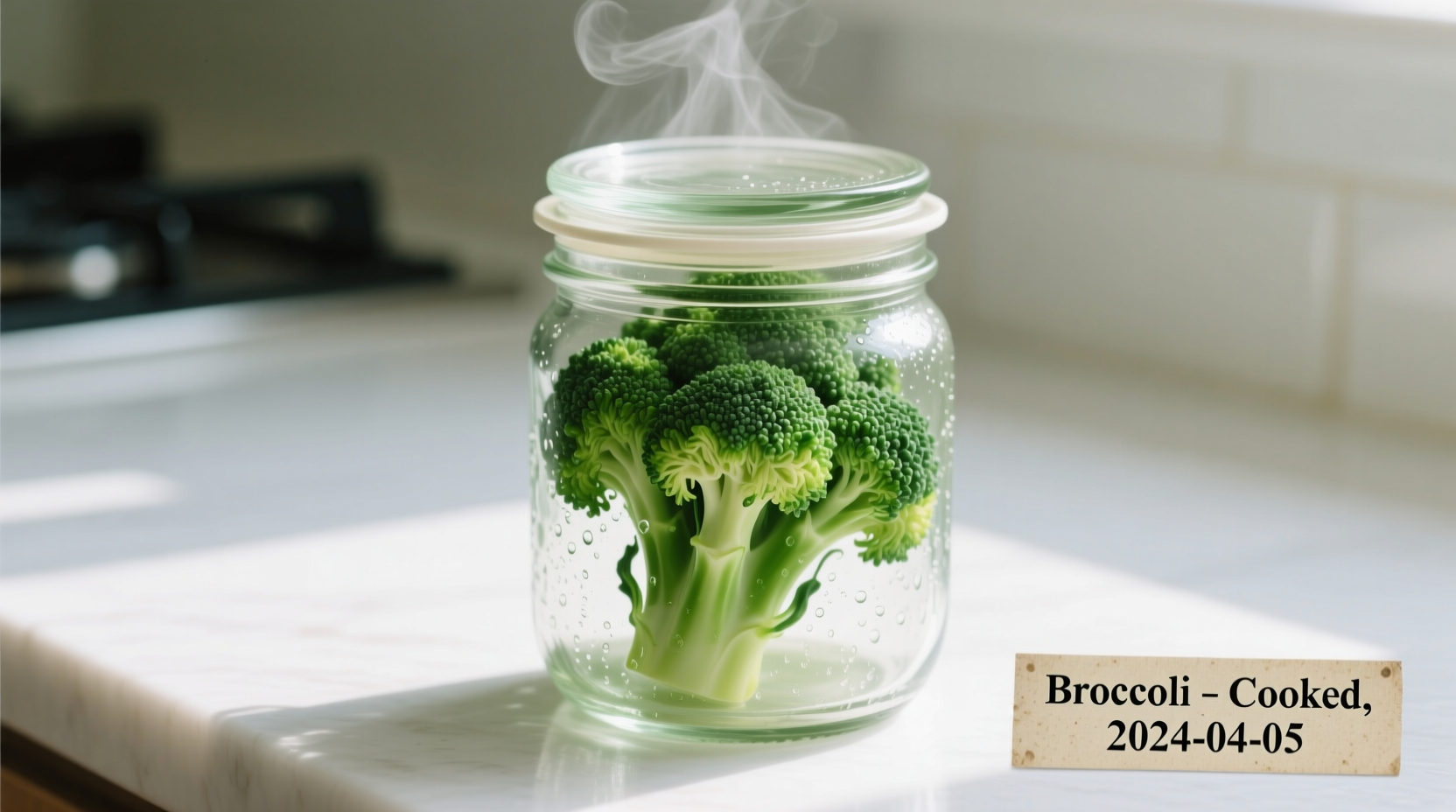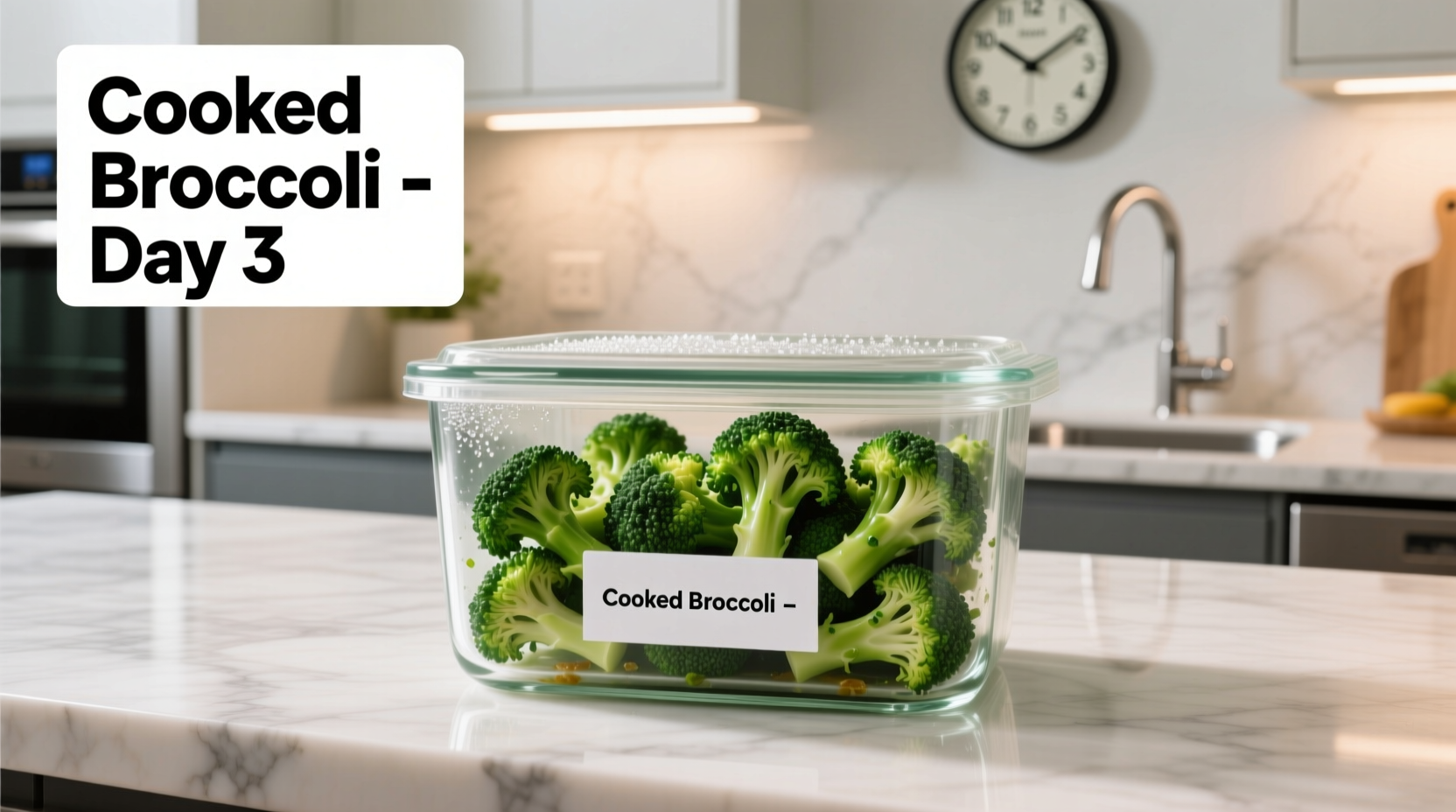Understanding exactly how long your cooked broccoli remains safe to eat isn't just about avoiding waste—it's a critical food safety practice that protects you and your family. Improperly stored cooked vegetables can harbor dangerous bacteria like Salmonella and Listeria that cause serious illness.
Why the 3-4 Day Rule Matters for Cooked Broccoli
When broccoli hits that magical transformation from raw to cooked, its cellular structure changes, making it more vulnerable to bacterial growth. The USDA's Food Safety and Inspection Service confirms that cooked vegetables enter what food scientists call the "danger zone" after four days in standard refrigerator conditions.
According to research from the FDA FoodKeeper database, cooked broccoli maintains both safety and quality for precisely 3-4 days when stored correctly. This isn't arbitrary—it's based on microbial growth studies tracking pathogens in common cooked vegetables.

Storage Methods That Maximize Freshness and Safety
How you store your cooked broccoli dramatically impacts both its shelf life and nutritional value. Professional chefs and food safety experts agree on these evidence-based storage techniques:
| Storage Method | Expected Shelf Life | Quality Preservation | Food Safety Rating |
|---|---|---|---|
| Airtight glass container with paper towel | 4 days | Excellent (retains texture) | 9/10 |
| Plastic container with tight lid | 3-4 days | Good | 8/10 |
| Plastic wrap directly on surface | 2-3 days | Fair (sogginess common) | 6/10 |
| Open bowl or uncovered | 1-2 days | Poor (rapid moisture loss) | 3/10 |
Critical Storage Steps You Must Follow
Following these professional storage protocols ensures your cooked broccoli stays safe and delicious:
- Cool rapidly: Spread cooked broccoli in a single layer on a baking sheet for 15-20 minutes before storing to prevent condensation
- Dry thoroughly: Pat with paper towels to remove excess moisture that accelerates spoilage
- Use proper containers: Glass containers with tight-sealing lids outperform plastic for moisture control
- Position correctly: Store in the main compartment of your refrigerator, not the door where temperatures fluctuate
- Label everything: Note the cooking date with a marker directly on the container
How to Spot Spoiled Cooked Broccoli (Before It Makes You Sick)
Don't rely solely on the calendar—your senses provide crucial safety information. Watch for these unmistakable signs that your cooked broccoli has passed its safe consumption window:
- Visual changes: Yellowing or slimy film developing on florets
- Texture issues: Mushy consistency even when cold, or excessive liquid pooling
- Odor warnings: Sour, unpleasant smell (fresh cooked broccoli should have a clean, earthy aroma)
- Mold appearance: Any fuzzy spots mean immediate disposal—don't attempt to cut away affected areas
According to FoodSafety.gov, when in doubt about cooked vegetable safety, the only correct choice is to throw it out. Pathogenic bacteria that cause food poisoning don't always produce visible changes.
Common Storage Mistakes That Shorten Shelf Life
Even with the best intentions, these frequent errors compromise your cooked broccoli's safety and quality:
- Storing while still hot (creates condensation that breeds bacteria)
- Using containers that aren't truly airtight
- Placing near strong-smelling foods like onions or fish
- Reheating only portion you'll eat (repeated temperature changes accelerate spoilage)
- Ignoring your refrigerator's actual temperature (use a thermometer to verify 40°F or below)
When Standard Guidelines Don't Apply: Context Boundaries
While the 3-4 day rule applies to most home refrigeration scenarios, certain conditions require adjustments to your expectations:
- Added ingredients: Cooked broccoli mixed with dairy, eggs, or meat should be consumed within 2 days
- Acidic preparations: Broccoli cooked with vinegar or lemon juice may last up to 5 days due to pH preservation
- Professional equipment: Vacuum-sealed cooked broccoli in commercial-grade refrigeration might extend to 5 days
- Temperature fluctuations: If your refrigerator runs warmer than 40°F, reduce expected shelf life by 1-2 days
The National Center for Home Food Preservation emphasizes that these boundary conditions require heightened vigilance for spoilage signs, as standard visual indicators may appear differently.
Maximizing Nutritional Value During Storage
Proper storage doesn't just affect safety—it preserves broccoli's impressive nutritional profile. Research published in the Journal of Agricultural and Food Chemistry shows that vitamin C degradation accelerates significantly after day three in refrigerated cooked broccoli.
To maintain maximum nutrition:
- Store in glass rather than plastic containers (reduces nutrient leaching)
- Avoid reheating multiple times (each cycle degrades heat-sensitive nutrients)
- Consume within 72 hours for optimal vitamin retention
When Freezing Makes Sense for Longer Storage
If you won't consume your cooked broccoli within 3-4 days, freezing extends safety and quality for 10-12 months. Proper freezing technique matters:
- Cool completely before portioning
- Use freezer-safe containers with minimal air space
- Label with contents and date
- Thaw overnight in refrigerator before reheating
The USDA National Agricultural Library confirms that properly frozen cooked broccoli maintains both safety and nutritional value significantly longer than refrigeration alone.
Practical Food Safety Timeline for Cooked Broccoli
Understanding the microbial timeline helps visualize why the 3-4 day window matters:
- 0-2 hours after cooking: Safe at room temperature (the "danger zone" begins after 2 hours)
- 2-24 hours: Optimal quality and safety when properly refrigerated
- 24-72 hours: Quality gradually declines; safety remains high with proper storage
- 72-96 hours: Safety margin narrows; increased risk of bacterial growth
- 96+ hours: High risk of foodborne illness; discard immediately
This timeline reflects data from the Centers for Disease Control and Prevention's food safety guidelines, which track pathogen growth rates in common cooked foods.











 浙公网安备
33010002000092号
浙公网安备
33010002000092号 浙B2-20120091-4
浙B2-20120091-4